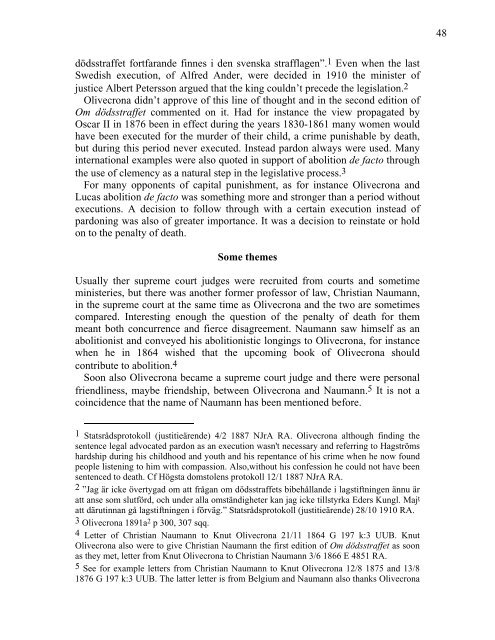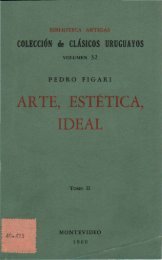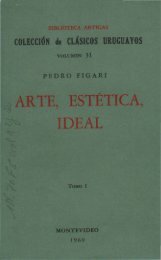Knut Olivecrona and his ”Om dödsstraffet”. - Figuras
Knut Olivecrona and his ”Om dödsstraffet”. - Figuras
Knut Olivecrona and his ”Om dödsstraffet”. - Figuras
Create successful ePaper yourself
Turn your PDF publications into a flip-book with our unique Google optimized e-Paper software.
dödsstraffet fortfar<strong>and</strong>e finnes i den svenska strafflagen”.1 Even when the last<br />
Swedish execution, of Alfred Ander, were decided in 1910 the minister of<br />
justice Albert Petersson argued that the king couldn’t precede the legislation.2<br />
<strong>Olivecrona</strong> didn’t approve of t<strong>his</strong> line of thought <strong>and</strong> in the second edition of<br />
Om dödsstraffet commented on it. Had for instance the view propagated by<br />
Oscar II in 1876 been in effect during the years 1830-1861 many women would<br />
have been executed for the murder of their child, a crime punishable by death,<br />
but during t<strong>his</strong> period never executed. Instead pardon always were used. Many<br />
international examples were also quoted in support of abolition de facto through<br />
the use of clemency as a natural step in the legislative process.3<br />
For many opponents of capital punishment, as for instance <strong>Olivecrona</strong> <strong>and</strong><br />
Lucas abolition de facto was something more <strong>and</strong> stronger than a period without<br />
executions. A decision to follow through with a certain execution instead of<br />
pardoning was also of greater importance. It was a decision to reinstate or hold<br />
on to the penalty of death.<br />
Some themes<br />
Usually ther supreme court judges were recruited from courts <strong>and</strong> sometime<br />
ministeries, but there was another former professor of law, Christian Naumann,<br />
in the supreme court at the same time as <strong>Olivecrona</strong> <strong>and</strong> the two are sometimes<br />
compared. Interesting enough the question of the penalty of death for them<br />
meant both concurrence <strong>and</strong> fierce disagreement. Naumann saw himself as an<br />
abolitionist <strong>and</strong> conveyed <strong>his</strong> abolitionistic longings to <strong>Olivecrona</strong>, for instance<br />
when he in 1864 wished that the upcoming book of <strong>Olivecrona</strong> should<br />
contribute to abolition.4<br />
Soon also <strong>Olivecrona</strong> became a supreme court judge <strong>and</strong> there were personal<br />
friendliness, maybe friendship, between <strong>Olivecrona</strong> <strong>and</strong> Naumann. 5 It is not a<br />
coincidence that the name of Naumann has been mentioned before.<br />
1 Statsrådsprotokoll (justitieärende) 4/2 1887 NJrA RA. <strong>Olivecrona</strong> although finding the<br />
sentence legal advocated pardon as an execution wasn't necessary <strong>and</strong> referring to Hagströms<br />
hardship during <strong>his</strong> childhood <strong>and</strong> youth <strong>and</strong> <strong>his</strong> repentance of <strong>his</strong> crime when he now found<br />
people listening to him with compassion. Also,without <strong>his</strong> confession he could not have been<br />
sentenced to death. Cf Högsta domstolens protokoll 12/1 1887 NJrA RA.<br />
2 ”Jag är icke övertygad om att frågan om dödsstraffets bibehåll<strong>and</strong>e i lagstiftningen ännu är<br />
att anse som slutförd, och under alla omständigheter kan jag icke tillstyrka Eders Kungl. Maj t<br />
att därutinnan gå lagstiftningen i förväg.” Statsrådsprotokoll (justitieärende) 28/10 1910 RA.<br />
3 <strong>Olivecrona</strong> 1891a 2 p 300, 307 sqq.<br />
4 Letter of Christian Naumann to <strong>Knut</strong> <strong>Olivecrona</strong> 21/11 1864 G 197 k:3 UUB. <strong>Knut</strong><br />
<strong>Olivecrona</strong> also were to give Christian Naumann the first edition of Om dödsstraffet as soon<br />
as they met, letter from <strong>Knut</strong> <strong>Olivecrona</strong> to Christian Naumann 3/6 1866 E 4851 RA.<br />
5 See for example letters from Christian Naumann to <strong>Knut</strong> <strong>Olivecrona</strong> 12/8 1875 <strong>and</strong> 13/8<br />
1876 G 197 k:3 UUB. The latter letter is from Belgium <strong>and</strong> Naumann also thanks <strong>Olivecrona</strong><br />
48






